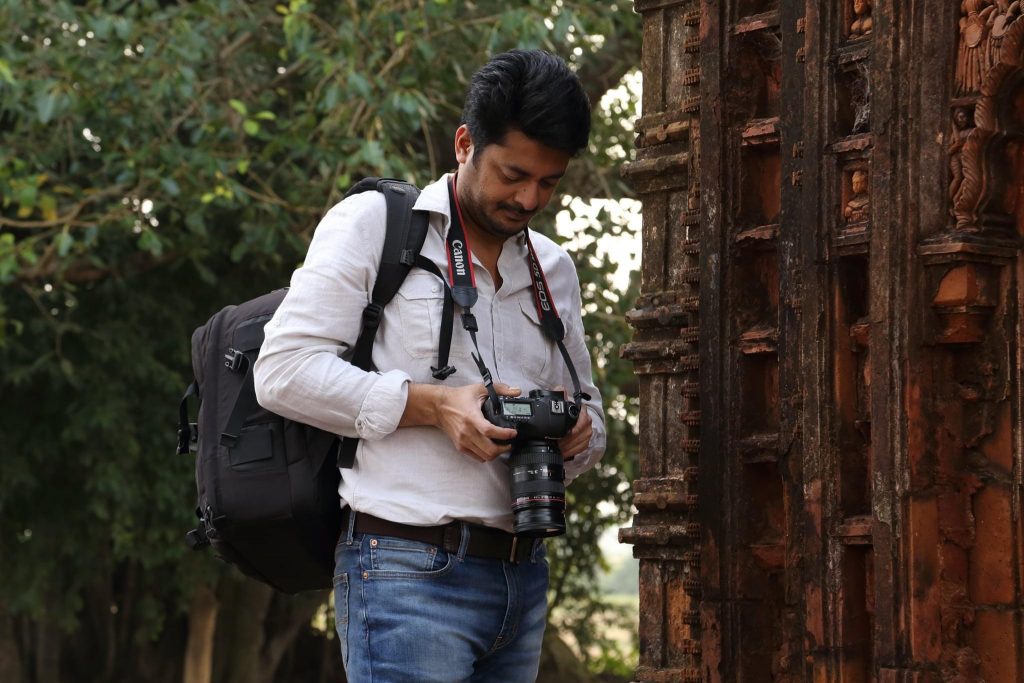National Award-winning production designer Indranil Ghosh makes his directorial debut with an action-filled narrative, Shironam, which means ‘headlines’. In the guise of a thriller, the narrative is designed to raise questions about ideology, life and about the choices one makes that may be read as a microcosm of life itself. It is all about how a contented married couple’s life can go completely berserk when the husband suddenly goes missing.
A gifted photographer (Jisshu Sengupta), who is more of an artist than a professional photographer, is unemployed. His wife has a good job but there are no schisms or ego hassles in this marriage. So when he suddenly lands a prized assignment as photographer for a famous news channel, he jumps at it though it will take him into a remote, distant place where his journalist friend (Saswata Chatterjee) has to interview a dreaded extremist. And then he goes missing. His wife (Swastika Mukherjee) suspects, like his friends and the media peers, that since it is a politically volatile area, he has been kidnapped…
The film is structured with two narrative tracks cutting into each other, one, to show the photographer trying to find his way back to the village hotel and the other depicting the reactions to his sudden and scary disappearance by his wife, his colleagues in the channel, the head of the news channel and his friends. The place settings therefore, are also juxtaposed against each other – the one peeping into the channel’s office, the photographer’s home and the other reaching out beyond the city limits to step into the wide open landscape in a deserted village where the last bus has left and the photographer is alone and lost. Lying beneath the surface of a young and happy man suddenly lost in a time and place he is not comfortable in, and his anxiety-ridden wife on the verge of a nervous breakdown, what slowly emerges is a scathing critique of how the media can not only be much more diabolic and cruel than politicians in choosing to hide or reveal stories that will draw eyeballs and send the TRPs riding sky-high but also when this involves one of its own staff who goes missing. The film was made some time ago and has already been screened in various film festivals in India, Madrid, London and beyond. Otherwise, one may have concluded its astonishing parallels from the wrong kind of slant the electronic media showered when a noted Bollywood actor died almost certainly by suicide.
The script is dynamic, tightly knit and filled with so much gripping action that it is a pleasure to wait with bated breath to see what happens next. The flow of the narrative is fluid, continuous and exciting. Indranil is a national award-winning art director so his production design, specifically of the red-light locale, the interiors of the narrow lane, the posh interiors of the home where the couple live, reflecting the home of an upper middle-class Bengali elite family are just right. The same goes for the costumes, which are spot on.
Sirsa Ray’s cinematography takes full advantage of the village scenes and rural landscape and more importantly, the magical lighting inside the red-light lane in the middle of the night. The way in which Ray has captured the village horizons with a bus cutting into the fog to speed away, the old, decaying murals in forgotten temples in close shots is praiseworthy. The late Sanjib Kumar Datta’s editing deftly cuts from one set of frames to the next seamlessly maintaining the pace and rhythm of the narrative beautifully. In one wonderful cut, a bangled hand suddenly lands on Jisshu’s shoulder and even as he turns back to see who it is, Datta moves into a completely different scene thereby heightening the suspense and frustrating us while keeping us eager as hell to know more simultaneously. A fine editor, his untimely death last year is a big blow for the film industry.The music is beautiful and economical but the background score, unfortunately, is much too loud and obtrusive, eating at times into the film’s otherwise smooth narrative flow.
Undoubtedly, the USP of Shironam lies in the brilliance of its cast – each actor hand-picked perfectly by the director knowing exactly what he wants out of each one. So, Swastika Mukherjee, who is finding her feet in good cinema at last, expresses the many shades of electrically changing emotions of battling with her husband’s disappearance with incredible mastery. Anjan Dutt is good as usual with his gigantic attitude, arrogance and starry airs as the diabolically shrewd channel head while Saswata Chatterjee is perfect as the journalist who is as concerned about his friend going missing as is his friend’s wife. Shantilal Mukherjee is excellent in an interesting cameo while Jisshu Sengupta as the photographer pours himself into a role that fits him perfectly. But the one actor who runs away with the cake, icing and cherry on top is Ankita Chakraborty as the young and pretty sex worker who finds it impossible to believe that a young man would choose to photograph her instead of sleep with her.
Shiroman is a happy mix of entertainment and ideology, social comment and media critique which you take with with you even after the film runs its course. The title of the film extends beyond just its literal meaning and that is quite an achievement.
Bengali, Thriller, Drama, Color
https://www.youtube.com/watch?v=Lmm7bE9L9q8


